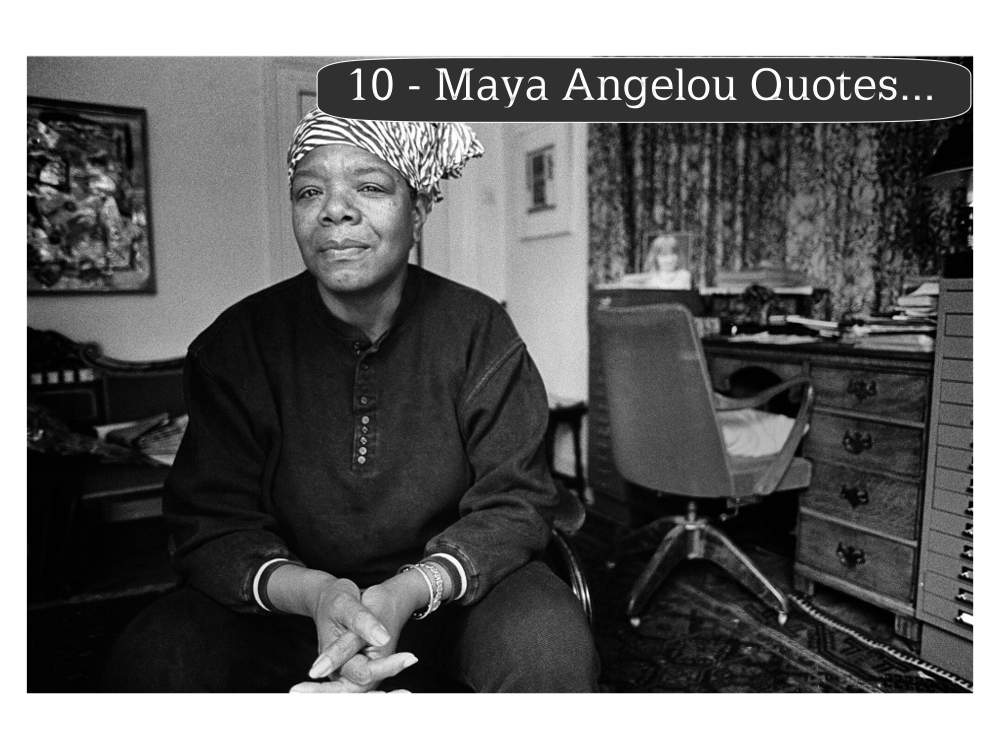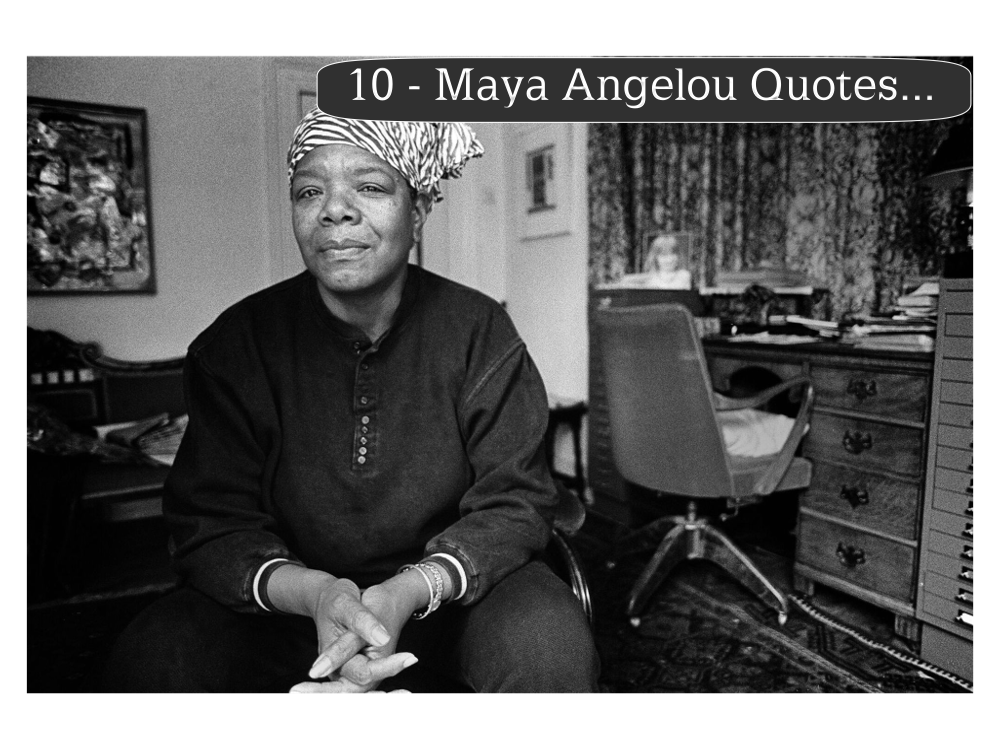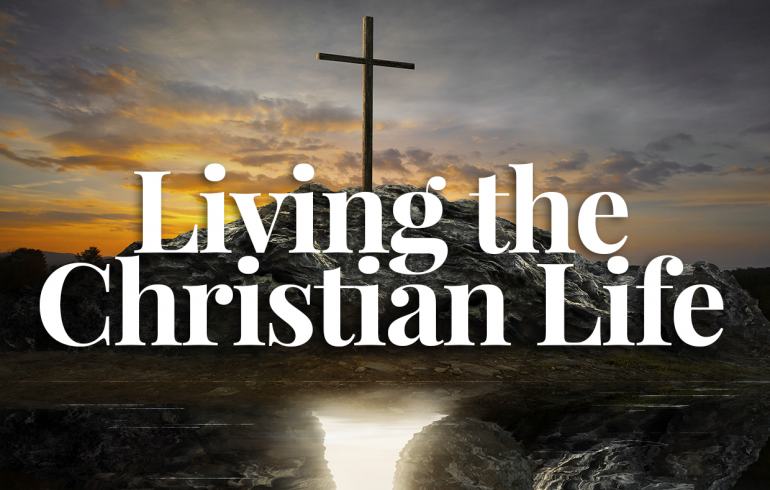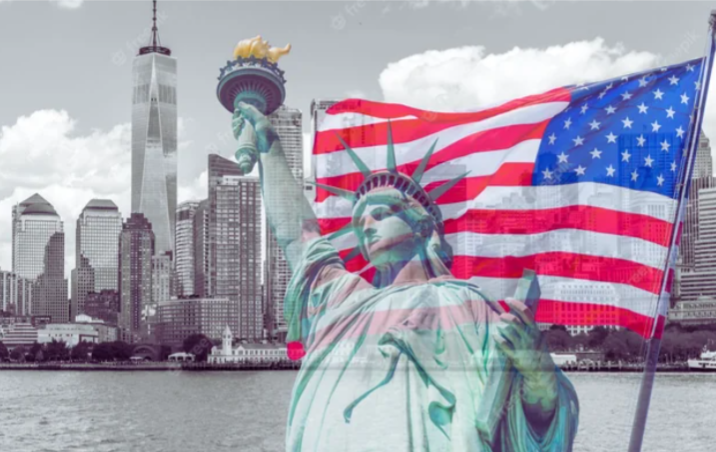-
 play_arrow
play_arrow
Praise 24/7 NO Today's Best Gospel
10 Maya Angelou Quotes on Growth, Kindness, and Power: A Deep Literary Look.

(ThyBlackMan.com) Few voices have spoken with as much enduring clarity, moral gravity, and emotional depth as Dr. Maya Angelou’s. The celebrated poet, memoirist, and cultural force left behind a treasure trove of quotations—words that have traveled beyond the pages of her poetry and memoirs and embedded themselves into the soul of global consciousness. For decades, students, artists, activists, and scholars have turned to Angelou’s wisdom for guidance, affirmation, and healing. In today’s rapidly shifting world, her words continue to illuminate pathways of self-love, resistance, truth, and empathy.
As a Literarian, I often encourage students not only to read Maya Angelou but to listen to her cadence—her linguistic power rooted in the Black oral tradition and the lyricism of survival. Below are ten of her most impactful quotes, each unpacked to explore their deeper literary meaning and contemporary significance.

1. “Do the best you can until you know better. Then when you know better, do better.”
At first glance, this quote seems like practical life advice. However, in a scholarly context, it is profoundly Socratic. It speaks to the evolution of moral consciousness—a recognition that learning is not simply an academic pursuit but a spiritual one. For Angelou, to know better is to be better. It’s an invocation of accountability tied to self-awareness.
The structure of the sentence—a shift from the present continuous (“do the best you can”) to the future conditional (“when you know better”)—places emphasis on personal growth as inevitable and necessary. It offers both grace and expectation. No one is perfect, but growth should be constant.
Angelou’s phrasing carries an implicit understanding of kairos—the right or opportune moment to act upon new understanding. This is a concept well-rooted in classical rhetoric and resonates in ethical philosophy as well. She doesn’t just call for knowledge acquisition; she demands moral responsiveness. One cannot hide behind ignorance forever. Once enlightenment is reached, inaction becomes indefensible.
In today’s increasingly complex world—where we are surrounded by evolving information about injustice, inequality, health, and technology—this quote encourages self-interrogation. What does it mean to live as a conscious citizen, friend, or leader? It’s not enough to apologize after harm is done; one must move forward in accountability and intention. The quote also gently rebukes performative wokeness and virtue signaling by implying that real change begins not in image but in action.
For educators, parents, and mentors, this becomes a philosophy of teaching: offer students compassion while also requiring them to grow beyond ignorance. It’s a reminder that knowledge should be transformative. And for the individual, it offers a powerful duality: a comfort that we’re allowed to evolve, and a challenge that we are also expected to.
2. “I’ve learned that people will forget what you said, people will forget what you did, but people will never forget how you made them feel.”
This quote is frequently cited in leadership seminars, graduation speeches, and classrooms alike. But as a professor of literature, I recognize it as a poetic triad that speaks to the emotional core of human experience. Angelou collapses language and action into the ultimate measure: emotional impact.
From a rhetorical standpoint, the repetition of “people will forget” sets up a rhythm that emphasizes the climactic final line: “people will never forget how you made them feel.” It suggests that affect—feeling—is the most lasting form of memory. This is consistent with African American storytelling traditions, where emotional truth often outweighs literal detail.
Beyond stylistics, this quote functions as a moral compass for human interaction. It reminds us that no matter the content of our intentions or the success of our deeds, our interpersonal presence leaves the deepest impression. It’s a call to conscious empathy. The words we speak or the achievements we parade may fade, but emotional resonance anchors itself in memory and can shape the very architecture of relationships.
Consider the pedagogical setting: students will forget the specific facts we teach, but they will remember if we believed in them, if we created safe spaces, or if we ignored their potential. In professional environments, colleagues recall not the PowerPoint presentations, but how they were treated when they failed, succeeded, or simply showed up as themselves.
This quote also echoes the African diasporic tradition of relational wisdom, where survival often depended on intuition, emotion, and human connection rather than formal declarations. Angelou, herself a deeply relational writer, understood the psychology of belonging. Her quote endures not because it’s catchy—but because it’s deeply true to the human condition.
In an increasingly digital world, where tone can be lost in emails and empathy diluted through screens, this quote gently insists on the power of presence. Be mindful of how you make others feel—not just what you offer them.
3. “When someone shows you who they are, believe them the first time.”
Angelou’s background in performance and narrative is key to understanding this quote. It reads like a stage direction for life: pay attention, observe, and don’t rewrite the script. Many of us are taught to give others the benefit of the doubt. This quote flips that idea on its head—not to promote cynicism, but to cultivate discernment.
Psychologically, this line echoes the teachings of boundary theory and emotional intelligence. It’s not about judging quickly but recognizing consistent behavior patterns. As Angelou often spoke of surviving trauma and betrayal, this quote is a protective mantra: don’t rationalize red flags; recognize them.
It also critiques our collective tendency to valorize potential over reality, especially in romantic, political, or familial relationships. We often give people unearned grace based on the imagined version of them we’ve constructed in our minds. Angelou’s clarity asks us to trust what is shown to us, not what we wish were true. It’s a masterclass in emotional realism.
From a literary perspective, this quote could be read as a warning against narrative distortion. Just as unreliable narrators attempt to sway readers through manipulated perception, individuals can present themselves in ways that confuse our instincts. Angelou urges us to trust action over narrative. What someone does reveals more than what they say. And we, as observers, must learn to take that revelation seriously.
Moreover, this quote resonates in conversations about self-worth and self-protection. It teaches that discernment is not cold-heartedness—it’s wisdom. For women, Black women especially, who are often expected to forgive endlessly and understand deeply, this quote liberates. It allows for distance. It grants permission to prioritize one’s emotional safety without guilt.
The first time someone shows you who they are may not be dramatic or overt—but it’s always instructive. Angelou’s insight encourages a lifelong practice of watching closely and trusting ourselves when the truth reveals itself.
4. “We delight in the beauty of the butterfly, but rarely admit the changes it has gone through to achieve that beauty.”
The metaphor of the butterfly is a time-honored one, but Angelou reclaims it with specificity and intention. She forces us to interrogate our romanticism of beauty and success without acknowledging the struggle that precedes it. Her quote aligns closely with Toni Morrison’s thematic concern with Black womanhood and transformation.
From a literary standpoint, this quote follows the tradition of parable. It uses nature as allegory and insists that transformation is not beautiful—it’s painful, raw, and necessary. The word “rarely” is key; it holds a mirror up to society’s habit of praising outcomes while ignoring the cost.
We love a polished surface: the bestseller, the entrepreneur, the graduate, the survivor. But we often turn away from the stories behind that surface—the sleepless nights, the battles with self-doubt, the tears shed in silence. Angelou reminds us that transformation requires a process of shedding, molting, becoming. And that process deserves recognition, not invisibility.
There’s also a subtext here of racial and gendered resilience. For Black women in particular, society delights in their excellence but often disregards the toll it takes to get there. The butterfly becomes a symbol not just of emergence, but of endurance—of survival through stages of isolation and transformation, often unseen.
In educational settings, this quote is a reminder to honor the journey of students, not just their performance. For artists and creators, it urges a reclaiming of the process as sacred. And for individuals navigating healing, it offers assurance that their mess is not disqualifying—it’s integral to the masterpiece they’re becoming.
Ultimately, Angelou reframes beauty as a narrative of change, not perfection. The scars are part of the story. The cocoon matters just as much as the wings.
5. “There is no greater agony than bearing an untold story inside you.”
Here we see the literary Angelou at her most confessional. This quote is deeply rooted in the traditions of memoir and testimonial literature. In fact, it comes from I Know Why the Caged Bird Sings, her groundbreaking autobiographical work. The word “agony” elevates silence from inconvenience to suffering. It’s not merely that withholding a story is difficult—it is excruciating.
Thematically, this line touches the heart of narrative theory and the human need for expression. The untold story here isn’t just a matter of literary output—it’s tied to identity, visibility, and healing. Storytelling becomes an existential necessity. One could even argue that Angelou draws on the tradition of the African griot, the community historian, in framing personal narrative as both preservation and liberation.
This quote resonates with those carrying hidden trauma, silenced truths, or unrealized dreams. Whether it’s a survivor unable to speak of pain, a child silenced by systemic neglect, or an artist afraid of judgment, Angelou offers both empathy and a directive: tell your story, or it may eat away at you from the inside.
In literature classrooms, this quote encourages students to find their voice—not for acclaim, but for survival. In a broader sense, it affirms that self-expression is not indulgent—it’s necessary. Angelou’s line is a reminder that unspoken truths don’t disappear. They simmer, waiting for the moment they can finally breathe.
6. “You may not control all the events that happen to you, but you can decide not to be reduced by them.”
Angelou’s work often traversed the terrain between control and surrender. This quote embodies that tension. The first clause acknowledges vulnerability, while the second asserts agency. It’s a powerful articulation of resistance without bitterness.
The phrasing “not to be reduced” is elegant and pointed. It speaks to dignity—a concept central to Angelou’s ethos. She isn’t promising protection from harm, but she is affirming the ability to maintain one’s full humanity in the face of it.
Philosophically, this quote echoes existential thought, particularly the idea that meaning is derived not from what happens to us, but from how we respond. Angelou makes that stance accessible, compassionate, and empowering. It’s not about denying pain—it’s about refusing to shrink beneath it.
The language here is notably gentle yet defiant. The word “decide” puts the burden of self-definition in our hands, even when external circumstances are chaotic. It’s a quiet declaration of sovereignty: others may attempt to box you in, but you choose whether or not to inhabit that box.
In healing circles, therapy spaces, and recovery narratives, this quote is often cited as a mantra for reclaiming power. It invites reflection on the space between victimhood and victory—an in-between where we make critical decisions about how to carry our wounds without being consumed by them.
7. “Try to be a rainbow in someone else’s cloud.”
In just a few words, Angelou encapsulates the ethic of kindness. But this quote is not just about being nice—it is a call to become a source of unexpected light during someone else’s darkness. Structurally, the sentence is metaphorical but accessible, echoing the style of children’s literature while carrying adult weight.
The image of the rainbow—a transient but breathtaking phenomenon—reminds us that sometimes small moments of grace carry enormous emotional weight. And the pairing with “someone else’s cloud” transforms this line from a generic call for niceness into a directive for compassionate presence during hard times.
Angelou isn’t asking for grand gestures. She’s asking for attentiveness, for intentional kindness. A note of encouragement. A phone call. A moment of listening. These “rainbows” often go unnoticed by the wider world, but they are transformational for the one standing in the rain.
From a pedagogical lens, this quote is foundational to student-teacher relationships. In the classroom, students may carry burdens unseen. A kind word or moment of validation can become the light that shifts the day—or even a life trajectory. Angelou’s wisdom here is subtle: she reminds us that in a world filled with noise, tenderness is revolutionary.
And in relationships—familial, romantic, communal—this quote reminds us that impact doesn’t require grandeur. It requires intention. Even amid your own storms, you can offer color to someone else’s sky.
8. “If you are always trying to be normal, you will never know how amazing you can be.”
This is Angelou the rebel speaking—the woman who defied expectations at every turn. The quote critiques conformity and champions authenticity. The word “normal” becomes a stand-in for societal expectations, while “amazing” represents untapped potential.
Linguistically, the sentence contrasts the mundane with the extraordinary. The repetition of “you” centers the reader as both subject and object—the one who limits, and the one with limitless potential. Angelou presents a fork in the road: choose normalcy and stay unseen, or choose selfhood and discover your brilliance.
The quote carries deep cultural and psychological weight. Many individuals—especially those from marginalized communities—are socialized to “fit in” for safety or acceptance. But this safety often comes at the cost of self-erasure. Angelou’s words disrupt that conditioning, insisting that one’s unique presence is not a liability—it’s a gift.
From a literary standpoint, this quote invokes the archetype of the hero’s journey—the call to adventure that requires leaving the familiar. Angelou reminds us that greatness often lives just beyond the borders of comfort. You cannot become remarkable if your primary ambition is to blend in.
For creatives, activists, thinkers, and misfits, this quote is a benediction. Permission to stand out. Encouragement to break molds. And validation that the extraordinary version of you already exists—it’s simply waiting for you to stop pretending to be someone else.
Finish story here; 10 Maya Angelou Quotes on Growth, Kindness, and Power: A Deep Literary Look.
Written by: Black Gospel Radio
Similar posts
-

Keepin’ It Real
with Jojo Walker & Jazzy Jenn
For every Show page the timetable is auomatically generated from the schedule, and you can set automatic carousels of Podcasts, Articles and Charts by simply choosing a category. Curabitur id lacus felis. Sed justo mauris, auctor eget tellus nec, pellentesque varius mauris. Sed eu congue nulla, et tincidunt justo. Aliquam semper faucibus odio id varius. Suspendisse varius laoreet sodales.
close Top popular

The Science of Happiness – Exploring Factors for Well-Being

Balancing Act: Prioritizing Your Well-Being in a Busy World

Overcoming Procrastination – Strategies for Productivity and Success

Unlocking Hidden Potential – A Guide to Personal Growth

Mindful Living – Cultivating Presence in the Modern Era

CONTACT US
- info@praise247no.com
FOLLOW US
- Praise247NO
- Praise247NO
- Praise247NO
Copyright 2024 Praise247no.com - All Rights Reserved.




Post comments (0)